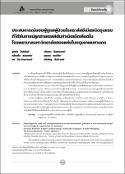บทคัดย่อ
การศึกษาเชิงคุณภาพนี้ใช้วิธีการสัมภาษณ์เชิงลึกเพื่อศึกษาประสบการณ์ของผู้ดูแลหลักของผู้ป่วยโรคโลหิตจางธาลัสซีเมียชนิดรุนแรงที่ได้รับการปลูกถ่ายเซลล์ต้นกำเนิดเม็ดเลือดที่ประสบความสำเร็จในศูนย์ให้บริการปลูกถ่ายฯ 2 แห่ง ใช้วิธีการเลือกผู้ให้ข้อมูลแบบเจาะจง หลังจากได้รับความยินยอมโดยสมัครใจ ทำการสัมภาษณ์แบบกึ่งมีโครงสร้างด้วยคำถามปลายเปิดและวิเคราะห์ข้อมูลการถอดเทปแบบคำต่อคำด้วยวิธีการวิเคราะห์เนื้อหาการสัมภาษณ์
จากการศึกษาพบว่ากระบวนการรักษาด้วยวิธีปลูกถ่ายฯให้กับผู้ป่วยธาลัสซีเมียชนิดรุนแรงต้องอาศัยความเข้าใจและความร่วมมือในกระบวนการรักษาจากครอบครัวของผู้ป่วยเป็นอย่างสูง ความยากลำบากทางเศรษฐกิจเป็นข้อจำกัดหลักต่อการเข้าถึงบริการนี้ เนื่องจากเป็นการรักษาที่มีค่าใช้จ่ายทางอ้อมสูงมากเช่นเดียวกับค่าบริการปลูกถ่ายฯ แม้ว่าเป็นกรณีที่สามารถเบิกจ่ายได้จากทุกกองทุนประกันสุขภาพในประเทศไทยแล้วก็ตาม
การป้องกันผู้ป่วยรายใหม่จึงมีความสำคัญมากเพื่อลดผลกระทบทั้งในภาคครัวเรือนและภาครัฐในการจัดสรรทรัพยากรมาใช้รักษาโรคที่ป้องกันได้ ดังนั้น ผู้กำหนดนโยบายด้านสาธารณสุขควรสื่อสารรณรงค์เพื่อให้เกิดความตระหนักในหมู่ประชาชน รวมถึงบุคลากรทางสาธารณสุขที่เกี่ยวข้องกับการดูแลรักษาผู้ป่วยธาลัสซีเมียควรมีความเข้าใจถึงอุปสรรคต่างๆที่อาจเกิดกับผู้ป่วยหรือครอบครัวและควรมีความมุ่งมั่นในการดำเนินการคัดกรองและป้องกันโรคธาลัสซีเมียให้ได้ผลมากยิ่งขึ้นทั้งในระดับนโยบายและการปฏิบัติ
บทคัดย่อ
This qualitative research used purposive sampling through in-depth interviews from main caregivers
whose severe ex-thalassemic children underwent successful hematopoietic stem cell transplantation (HSCT). Participated caregivers were interviewed using a semi-structured questionnaire based on openended
questioning and tape-recorded after receiving their informed consent. Transcripts of the interviewed
were created verbatim and examined using content analysis.
Results revealed that HSCT treatment procedure requires comprehensive understanding and cooperation
from patients and their families. Economic household burden is the main hindrance for accessibility
toward this service owing to its high direct non-medical costs as well as service charges although
HSCT can be reimbursed from all Thai health insurance schemes.
It is very crucial to prevent new thalassemic cases in order to alleviate the impact on the resource
allocation for treating a preventable disease in both household and public sectors. Therefore, public health
policy makers should consider creating a disease awareness campaign among citizens as well as healthcare
personnel who should have the comprehensive understanding about potential obstacles of the patients or
families and should commit to perform more effective thalassemia screening and prevention both in policy
and routine practice aspects.


